Filter by
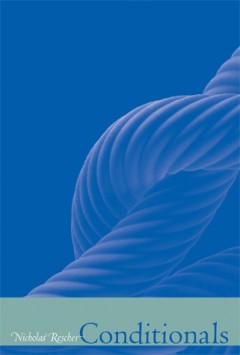
Conditionals
"A Bradford Book."A unified treatment of conditionals based on epistemological principles rather than the semantical principles in vogue over recent decades.OCLC-licensed vendor bibliographic record.
- Edition
- -
- ISBN/ISSN
- 9780262282321
- Collation
- 1 online resource (246 pages) :illustrations
- Series Title
- -
- Call Number
- -

Anti-individualism and knowledge
"A Bradford book."Contemporary philosophy of mind is dominated by anti-individualism, which holds that a subject's thoughts are determined not only by what is inside her head but also by aspects of her environment. Despite its dominance, anti-individualism is subject to a daunting array of epistemological objections: that it is incompatible with the privileged access each subject has to her tho…
- Edition
- -
- ISBN/ISSN
- 9780262269346
- Collation
- 1 online resource (xiv, 339 pages).
- Series Title
- -
- Call Number
- -

Participating in explanatory dialogues :interpreting and responding to questi…
While much has been written about the areas of text generation, text planning, discourse modeling, and user modeling, Johanna Moore's book is one of the first to tackle modeling the complex dynamics of explanatory dialogues. It describes an explanation-planning architecture that enables a computational system to participate in an interactive dialogue with its users, focusing on the knowledge st…
- Edition
- -
- ISBN/ISSN
- 9780262280136
- Collation
- 1 online resource (xiv, 352 pages) :illustrations.
- Series Title
- -
- Call Number
- -
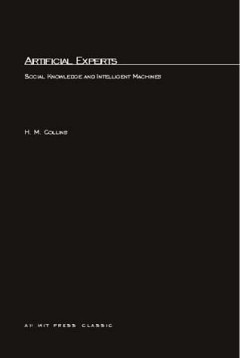
Artificial experts :social knowledge and intelligent machines
In Artificial Experts, Collins explains what computers can't do, but he also studies the ordinary and extraordinary things that they can do. He argues that the machines we create are limited because we cannot reproduce in symbols what every community knows, yet we give our machines abilities by the way we embed them in our society. He unfolds a compelling account of the difference between human…
- Edition
- -
- ISBN/ISSN
- 0262255936
- Collation
- 1 online resource (xiii, 266 pages) :illustrations.
- Series Title
- -
- Call Number
- -
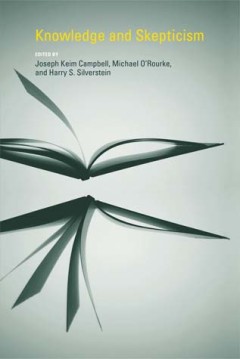
Knowledge and skepticism, Volume 5
There are two main questions in epistemology: What is knowledge? And: Do we have any of it? The first question asks after the nature of a concept; the second involves grappling with the skeptic, who believes that no one knows anything. This collection of original essays addresses the themes of knowledge and skepticism, offering both contemporary epistemological analysis and historical perspecti…
- Edition
- -
- ISBN/ISSN
- 9780262265782
- Collation
- 1 online resource (viii, 367 pages, 4 unnumbered pages of plates) :illustrations (some color).
- Series Title
- -
- Call Number
- -
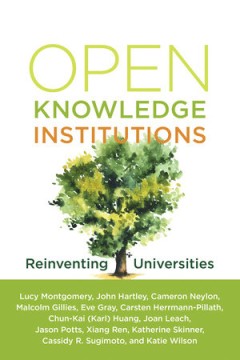
Open Knowledge Institutions: Reinventing Universities
The future of the university as an open knowledge institution that institutionalizes diversity and contributes to a common resource of knowledge: a manifesto. In this book, a diverse group of authors—including open access pioneers, science communicators, scholars, researchers, and university administrators—offer a bold proposition: universities should become open knowledge institutions, …
- Edition
- -
- ISBN/ISSN
- 9780262365154
- Collation
- -
- Series Title
- -
- Call Number
- -
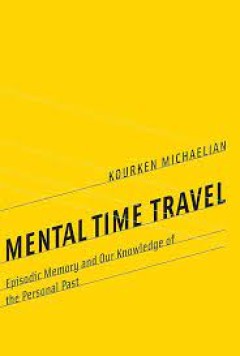
Mental time travel episodic memory and our knowledge of the personal past
"In this book, Kourken Michaelian builds on research in the psychology of memory to develop an innovative philosophical account of the nature of remembering and memory knowledge.\sCurrent philosophical approaches to memory rest on assumptions that are incompatible with the rich body of theory and data coming from psychology.\sMichaelian argues that abandoning those assumptions will result in a …
- Edition
- -
- ISBN/ISSN
- 9780262334570
- Collation
- 1 online resource (xx, 291 pages) :illustrations.
- Series Title
- -
- Call Number
- -
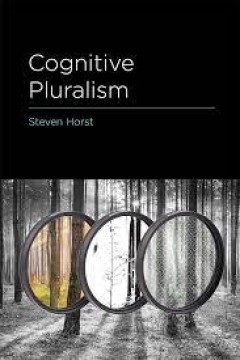
Cognitive pluralism
An argument that we understand the world through many special-purpose mental models of different content domains, and an exploration of the philosophical implications. Philosophers have traditionally assumed that the basic units of knowledge and understanding are concepts, beliefs, and argumentative inferences. In Cognitive Pluralism, Steven Horst proposes that another sort of unit--a mental mo…
- Edition
- -
- ISBN/ISSN
- 0262333627
- Collation
- 1 online resource (xii, 360 pages) :illustrations, maps
- Series Title
- -
- Call Number
- -
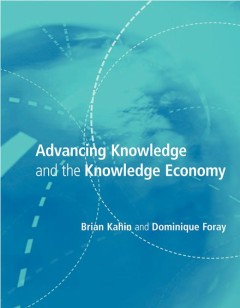
Advancing Knowledge and the Knowledge Economy
"Inspired by a panel on the transformation of knowledge at the Transforming Enterprise conference"--Page x.The revolution in information technology transforms not only information and its uses but, more important, knowledge and the ways we generate and manage it. Knowledge is now seen as input, output, and capital, even if imperfectly accounted for or understood. Many businesses and public agen…
- Edition
- -
- ISBN/ISSN
- 9780262256452
- Collation
- 1 online resource (x, 503 pages) :illustrations
- Series Title
- -
- Call Number
- -
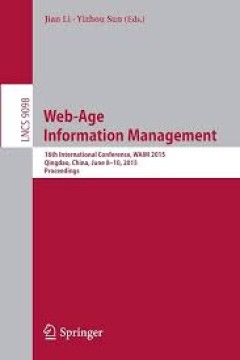
Web-Age Information Management 16th International Conference, WAIM 2015, Qin…
This book constitutes the refereed proceedings of the 16th International Conference on Web-Age Information Management, WAIM 2015, held in Qingdao, China, in June 2015. The 33 full research papers, 31 short research papers, and 6 demonstrations were carefully reviewed and selected from 164 submissions. The focus of the conference is on following topics: advanced database and web applications, bi…
- Edition
- -
- ISBN/ISSN
- 978-3-319-21042-1
- Collation
- -
- Series Title
- -
- Call Number
- -
 Computer Science, Information & General Works
Computer Science, Information & General Works  Philosophy & Psychology
Philosophy & Psychology  Religion
Religion  Social Sciences
Social Sciences  Language
Language  Pure Science
Pure Science  Applied Sciences
Applied Sciences  Art & Recreation
Art & Recreation  Literature
Literature  History & Geography
History & Geography